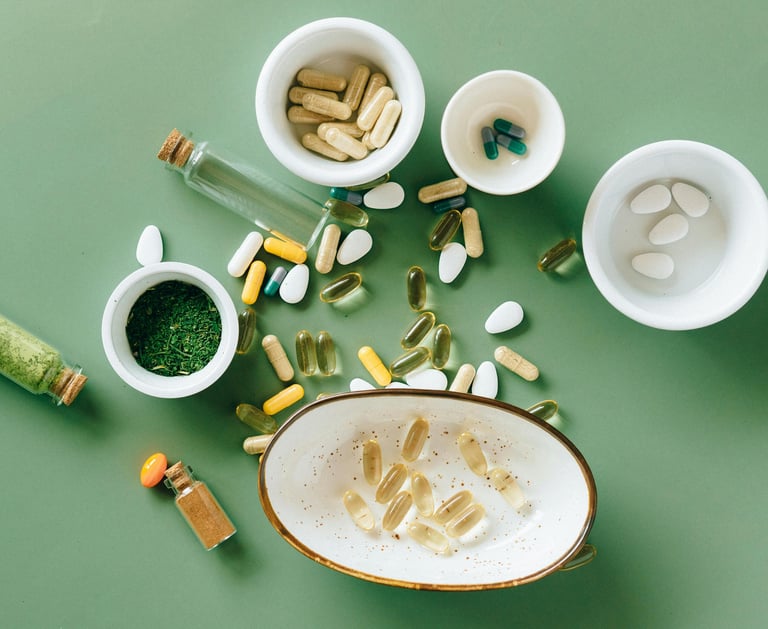OUT NOW: 8 WEEK TRANSFORMATION PROGRAM
The Truth About Testosterone Boosters: What Really Works?
Want to know the truth about testosterone boosters? These supplements promise to supercharge your strength, energy, and vitality, but do they really deliver? In this article, we challenge the science behind testosterone boosters, separating fact from fiction to help you make informed decisions about your health.
SUPPLEMENTS
12/18/20243 min read
Testosterone: the ultimate hormone of vitality and muscle power. It’s no wonder that testosterone boosters are a hot topic in the fitness and health world. But here’s the million-dollar question: are these supplements the key to unleashing your inner superhero, or are they just another overhyped product?
Let’s look into the science (and myths) of testosterone boosters with a dose of fun and facts.


What Are Testosterone Boosters?
Imagine testosterone boosters as the "energy drinks" of the hormone world. They promise to jack up your testosterone levels with a blend of natural ingredients like herbs, vitamins, and minerals. Popular players in the booster game include tribulus terrestris, fenugreek, zinc, magnesium, and vitamin D. The pitch? Boost your body’s testosterone production and get all the glorious benefits that come with it. But does the science back up the buzz?
The Science:
Myth-Busting Time
Not all testosterone boosters are created equal. Some have legit science behind them; others are more like wishful thinking in a bottle. Let’s break it down ingredient by ingredient:


1. Tribulus Terrestris
This plant sounds exotic and promises big results. But spoiler alert: most studies show it’s more bark than bite. One study in the Journal of Ethnopharmacology found no significant testosterone boost in men with normal levels. So, if you’re healthy, tribulus is more likely to boost your disappointment than your testosterone. (Wiklund et al., 2016)
2. Vitamin D
Here’s a true MVP. If you’re low on vitamin D, you might also be low on testosterone. Studies show that vitamin D supplementing can help restore those levels. It’s like sunshine in a pill! (Pilz et al., 2011)
3. Zinc and Magnesium
Think of these as the behind-the-scenes crew. They’re essential for testosterone production, but unless you’re deficient, popping extra won’t turn you into The Hulk. (Prasad, 2013)
4. Ashwagandha
Ashwagandha isn’t just fun to say; it’s also one of the more promising ingredients. This adaptogenic herb can lower stress (bye-bye, cortisol!) and indirectly give your testosterone a little nudge. One study even showed increased muscle strength and testosterone levels in men who used it. (Wankhede et al., 2015)
The Placebo Effect: A Real Magic Trick?
Here’s the wild part: believing that something works can actually make you feel better. This is called the placebo effect, and it’s real. So, if you’re convinced that your testosterone booster is giving you energy, there’s a good chance your brain is doing the heavy lifting.
Are Testosterone Boosters Safe?
Most natural ingredients like vitamin D and zinc are safe when taken as directed. But some supplements might contain unregulated or sketchy additives. A study in the Journal of Dietary Supplements found that certain products contained traces of steroids. Yikes! Always read the label and stick to reputable brands. (Martínez-Sanz et al., 2021)
Who Should Use Testosterone Boosters?
If you’ve been medically diagnosed with low testosterone, supplements like vitamin D or zinc might help — especially if you’re deficient. But for the average guy, the benefits of boosters are often underwhelming. Want a real testosterone boost? Focus on the basics: sleep like a champ, eat a balanced diet, lift heavy things, and keep stress in check. It’s not flashy, but it works.
The Bottom Line
Testosterone boosters: are they a scam or a solution? The truth is somewhere in the middle. Some ingredients, like vitamin D and ashwagandha, have genuine potential, but they’re no magic pills. The best way to boost testosterone is through healthy lifestyle choices. And if you’re curious about supplements, consult a healthcare professional before diving in.
So, next time you see a flashy ad for a testosterone booster, remember: your inner superhero doesn’t come from a bottle. It comes from you.
References
Pilz, S., et al. (2011). "Effect of Vitamin D supplementation on testosterone levels in men." Hormone and Metabolic Research.
Prasad, A. S. (2013). "Zinc is an antioxidant and anti-inflammatory agent: its role in human health." Biological Trace Element Research.
Wankhede, S., et al. (2015). "Examining the effect of Withania somnifera supplementation on muscle strength and recovery." Journal of the International Society of Sports Nutrition.
Wiklund, E., et al. (2016). "The role of Tribulus terrestris in testosterone production: A systematic review." Journal of Ethnopharmacology.
Martínez-Sanz, J. M., et al. (2021). "Adulteration in dietary supplements: A threat to health." Journal of Dietary Supplements.
